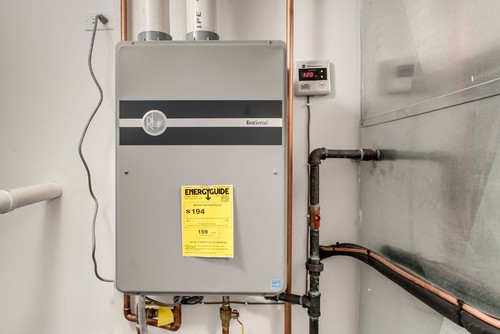Does a Tankless Water Heater Save on Water Usage? Pros and Cons
[ad_1]
Tired of waiting for the shower water to heat up? Tankless water heaters warm on demand—and they deliver consistent hot water for as long as you need. That means no longer having to tough it out with streams of ice-cold water when you’re last in line for the shower.
But while tankless water heaters score a big point for providing instant hot water, do they save on water usage?
“There are some instances that they will,” says Brian Fenske, director of commercial sales for Navien, a tankless water heater and boiler manufacturer. “If the tankless unit is located closer to the fixtures, less water will be wasted because you don’t have to spend as much time waiting for the purge of cool water in the pipe, and the hot water to arrive.”
Common sense will tell us that the best way to save on water usage is to change your habits. Limiting your shower time and turning off the shower as you soap and shampoo can go a long way.
But if you’re considering going an extra step and upgrading to a tankless water heater, here are some pros and cons.
Pro: A tankless water heater will save money in the future
The investment you put into a tankless water heater will save you money in the long run, experts say, since gas and electricity won’t be running to constantly maintain water temperature.
Fenske says tankless water heaters have “much higher operating efficiencies in the range of 30% to 45% over conventional residential gas-fired tanks.”
Plus, tankless water heaters typically last more than 20 years, compared with 10 to 15 years for traditional water heaters, and their efficiency is improving all the time.
“Technology is getting better and better on tankless water heaters, whereas tank water heaters have reached a plateau,” says Carlos Cabrera, owner and operator of Verday Smart Solutions in San Diego.
Con: High initial cost
Tankless water heaters have many advantages, but one disadvantage for some homeowners can be the price.
“Tankless water heaters are usually more expensive than traditional tank water heaters—two or two-and-a-half times more expensive,” says Cabrera.
Fenske says elevated installation or retrofit costs can be a disadvantage, as well as additional components and parts.
“However, today these are as dependable as our other appliances, giving us years of service,” says Fenske.
But beyond the initial cost, homeowners can look forward to a reduction in their monthly energy bills and save hundreds of dollars a year.

Photo by Steele Consulting Group
Pro: On-demand hot water
We use hot water every day for showers, laundry, and dishwashing. Tankless water heaters provide hot water at a rate of 2 to 5 gallons per minute, according to the Department of Energy. They produce hot water only when you turn on the faucet and run more efficiently.
Since tankless water heaters don’t operate by storing and heating water, they never run out of hot water and provide endless and consistent delivery of hot…
[ad_2]
Read More: Does a Tankless Water Heater Save on Water Usage? Pros and Cons
